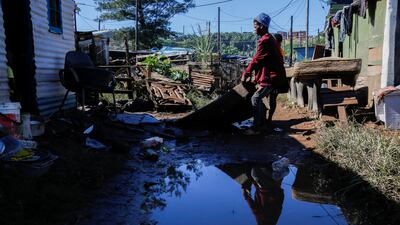Heavy rains and flooding have killed at least 341 people in South Africa’s eastern KwaZulu-Natal province, including the city of Durban, with more rainstorms expected in the coming days.
Officials expect the death toll to rise as scores of people, including whole families, are still missing.
South African President Cyril Ramaphosa on Thursday visited victims of the devastating east coast floods.
“You are battling one of the biggest incidents we have seen and we thought this only happens in other countries, like Mozambique or Zimbabwe,” Mr Ramaphosa told victims.
The damage to Durban and the surrounding eThekwini metropolitan area is estimated at $52 million, eThekwini Mayor Mxolosi Kaunda said on Thursday.
Officials temporarily closed all schools in the province, after at least 18 pupils and one teacher from different schools died in the floods, Education Minister Angie Motshekga said.
The persistent rains have wreaked havoc in the province, destroying homes, collapsing buildings and washing away major roads.
Mozambique has also suffered a series of devastating floods over the past decade, including one last month that killed more than 50 people.
Scientists predict global warming could mean Africa's south-east coast is hit harder by such weather systems over the next few decades.
These most recent rains have been described as not tropical, but rather caused by a weather system called a cut-off low that had brought rain and cold weather to much of the country.
Meanwhile, police used stun grenades to disperse residents in the Reservoir Hills areas of Durban who were protesting against the lack of official assistance, according to South African media reports.
The South African National Defence Force has sent troops to assist with rescue and mop-up operations.
The floods have knocked out water and electricity to large parts of Durban and the surrounding eThekwini metropolitan area and it will take at least a week to restore those services, officials said.
The storm also forced Sub-Saharan Africa's most important port to halt operations, as a main access road suffered heavy damage.
Sections of other roads were washed away, leaving behind gashes in the earth bigger than large lorries.












